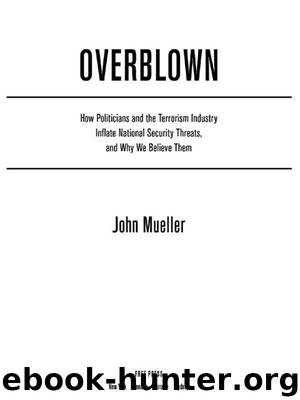Overblown by John Mueller

Author:John Mueller
Language: eng
Format: epub
Publisher: Free Press
Conclusion: Complexity, Rogues, Terrorism,
and the Catastrophe Quota
Several conclusions about international threat perception emerge from this assessment of international anxieties in the post–cold war world. All of them relate, in one way or another, to perceptions about terrorism after 9/11.
First, there seems to exist something that might be called a catastrophe quota: when big problems go away, smaller ones become magnified in importance to compensate. Accordingly, things never get better. Once the defining horror of the post–World War II era—the prospect of global destruction through thermonuclear war—faded, comparatively minor ones were deftly elevated to fill the gap: civil or ethnic war in distant places, problems presented by little countries with noisy, if pathetic, dictators, and the ever-present “complexity.” 49 None of these was remotely new, anymore than terrorism is after 9/11, but they often seemed that way because they had previously been obscured by more monumental preoccupations.
Second, when unfamiliar problems come to arrest the public and political consciousness, there is a demand for easily graspable, if often simplistic and spooky, explanations that can set the mind at rest. Thus, the wars in Yugoslavia became exercises in “ancient ethnic hatreds,” even though Serbs and Croats, for example, had virtually never fought each other before the distinctly nonancient event known as World War II. The Kims of North Korea and Saddam Hussein of Iraq (a former semially) were typecast as irrational devils (or rogues) who were out to get the mighty, if distant, United States, therefore representing an international threat that was sometimes seen to be on the scale of the one once presented by the well-remembered and truly devilish Adolf Hitler. Much of the post-9/11 (and some of the pre-9/11) rhetoric and public wisdom about terrorism and about the diabolical demons of al-Qaeda has inspired similar comforting, if knee-jerk and misdirecting, explanations.
Third, the dramatic—that is to say, attention-arresting—appeal of singular devils in the world remains. In this, we seem to be repeating past experience with Egypt’s Nasser, Indonesia’s Sukarno, Cuba’s Castro, Libya’s Qaddafi, Iran’s Khomeini, and others. In all cases, the threat these devils du jour actually posed to American and global interests proved to be very substantially exaggerated. Nasser and Sukarno are now footnotes, Castro a joke, and Qaddafi a mellowed irrelevance, while Khomeini’s Iran became just about the only place in the Middle East where Americans were regularly treated with popular admiration and respect, at least until around 2003. (Significantly, Iran was also just about the only place in the area where the United States had been unable to meddle for over twenty years; it is possible there is a lesson here.) This experience notwithstanding, the preoccupation in the post–cold war era with the antics of colorful tyrants in minor countries, and in particular the imaginings about the international, even global, threat they supposedly pose, very much continues. First it was Iraq’s Saddam, now it is Iran’s Ahmadinejad.
Fourth, top leaders of major countries can become so emotionally obsessed and personally infected by even minor challenges that they can become absurdly
Download
This site does not store any files on its server. We only index and link to content provided by other sites. Please contact the content providers to delete copyright contents if any and email us, we'll remove relevant links or contents immediately.
The Borden Murders by Sarah Miller(4325)
The Secret Barrister by The Secret Barrister(3708)
Police Exams Prep 2018-2019 by Kaplan Test Prep(2546)
Coroner's Journal by Louis Cataldie(2477)
The Splendid and the Vile by Erik Larson(2472)
Terrorist Cop by Mordecai Dzikansky & ROBERT SLATER(2078)
A Colony in a Nation by Chris Hayes(1934)
My Dark Places by James Ellroy(1931)
The Art of Flight by unknow(1878)
Black Klansman by Ron Stallworth(1793)
Objection! by Nancy Grace(1782)
A Life of Crime by Harry Ognall(1729)
The New Jim Crow by Michelle Alexander(1702)
Anatomy of Injustice by Raymond Bonner(1668)
American Prison by Shane Bauer(1658)
Invisible Women by Caroline Criado Perez;(1642)
Whoever Fights Monsters by Robert K. Ressler(1616)
Obsession (The Volkov Mafia Series Book 1) by S.E Foster(1578)
A is for Arsenic: The Poisons of Agatha Christie (Bloomsbury Sigma) by Kathryn Harkup(1548)
